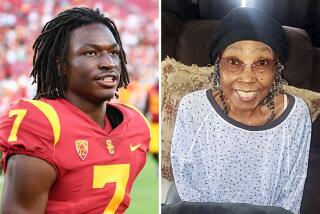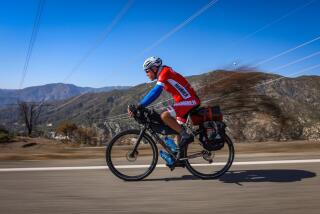When the Running Stopped
- Share via
One sees his face through hazy sunshine as the photograph is tilted to ease the glare. Troy Anthony Blocker. The face smiles back at the world with a sweetness that matches the serenity of a summer day.
Here is a boy, one thinks, who will run through life with the speed of a gazelle, racing the wind across open fields and down winding pathways, a heartbeat ahead of his past, a half-step behind his future.
And run he did, with an ebullience that only youth can evoke, for Troy was only 7 and 7 was a dazzling place to be.
Then one day the running stopped.
Everyone knew it would. Troy had AIDS. Eventually, all that energy, all that sweetness, all that perfect embodiment of life would fade. A rustle in the treetops, then silence.
“Here’s another picture,” Diane Fink says.
We are sitting at a table in Pan Pacific Park. A basketball is bounced nearby in a steady, drumming rhythm. The laughter of children floats past like petals in a breeze.
“He’s with his brother Aaron,” she says, shading the picture with her hand. “Aaron was two years younger. When I’d go to their house Aaron would holler, ‘Here comes the white lady!’ ”
Diane smiles.
“They were more than brothers,” she says. “They were friends.”
Troy Anthony Blocker. April 2, 1981--June 16, 1989.
We meet him vicariously through Diane Fink, a tiny, red-haired woman in her 50s.
Divorced and living comfortably in Beverly Hills, Diane entered Troy’s life through the Family Outreach unit of L.A. Youth Programs, an organization that serves children.
Troy had been a premature baby and had contracted AIDS through a blood transfusion. Diane had survived a brain tumor and vowed she would celebrate that survival by helping others.
Their paths crossed last October when Diane was assigned to assist Troy and his family. Soon, she and the brothers were a familiar trio at the Westside’s Pan Pacific Park.
“They loved this place,” Diane says, looking around. “We came here every Saturday. Regulars would wonder about the white lady and two little black kids. One child came up to me one day and said, ‘Do you live together?’ ”
Troy and Aaron brought their scooters and rode them down the lawn-bordered pathways from an upper play yard to a lower picnic area.
“They would banter back and forth all the way down,” Diane says. “You could see the progress of the disease over the weeks. Aaron continued to bloom, but Troy was wilting. . . .”
When he was old enough to understand, Troy was told he had AIDS and would die. He said simply, “Don’t tell my friends.”
“He was such a bright child,” Diane says. “He knew how the fear of the disease creates such a prejudice. Kids with AIDS don’t have friends.”
She remembers the 5th birthday party of another boy with AIDS.
“Children came to the party but their parents insisted on two cakes. They were afraid the disease would spread when the candles were blown out.”
She watches other children play for a moment, then says absently, “In the last weeks, Troy wouldn’t look at kids his own age. He’d turn his back as though he couldn’t bear to see healthy children. Aaron would ask, ‘What’s the matter?’ but he wouldn’t answer.”
One of Troy’s last great pleasures was a bicycle. He rode it only a few times, until the relentless progress of dying sapped his strength, and he was forced to lean it against the foot of his bed for the last time.
“It was hard for him to ride it,” Diane says, “but he kept trying. It was such a brief pleasure. But sometimes a moment’s joy is all we get in life, isn’t it?”
I came to know Troy that sunny day in the park.
He was everyone’s little boy and his death leaves unanswered all the questions of his future, all the glory of his potential. And it also leaves unanswered the last question asked by his brother.
On the morning Troy died, Aaron touched his face and in an anguish that claws at the heart said softly, “I thought we were going to grow up together.”
I returned to the park alone the next day and studied Troy’s picture. A soft breeze caught it and tilted it toward the sun. His face vanished in the blinding glare.
More to Read
Sign up for The Wild
We’ll help you find the best places to hike, bike and run, as well as the perfect silent spots for meditation and yoga.
You may occasionally receive promotional content from the Los Angeles Times.






